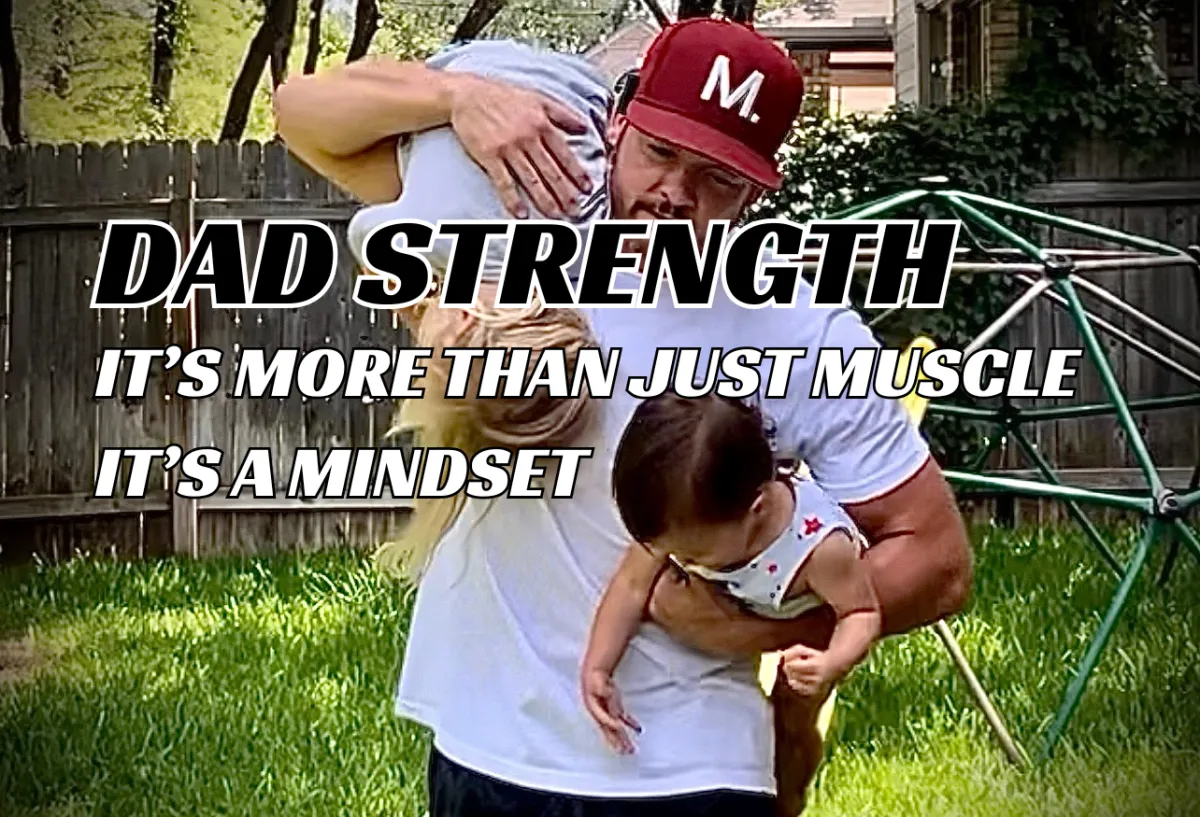
DAD STRENGTH: IT'S MORE THAN JUST MUSCLE, IT'S A MINDSET
When most people hear the term “dad strength,” they imagine burly arms lifting kids over their heads or moving furniture with ease. And sure muscle plays a part. But real dad strength runs deeper than physical power. It’s about showing up, staying consistent, and building the kind of resilience that shapes not just bodies, but lives.
Whether you're chasing your kids around the yard or leading by example in your household, true dad strength is built from the inside out, forged in discipline, fueled by purpose, and rooted in a mindset that doesn’t quit.
The Hidden Weight of Fatherhood
Being a dad means carrying more than just the weight in the gym. You're lifting the expectations of your family, the stress of work, financial responsibilities, and the need to be a role model every single day. Training becomes more than a physical outlet, it’s a tool for managing that pressure.
Exercise has been shown to significantly reduce symptoms of stress, anxiety, and depression...all challenges many fathers silently face. A study from the American Psychological Association confirmed that regular physical activity improves mood and reduces stress hormones like cortisol [1].
When you make training a consistent part of your life, you're not just building muscle, you're building mental armor.
Why Mindset is the Muscle That Matters Most
Muscles can atrophy. Schedules can get crazy. But mindset? That’s what brings you back every time life tries to knock you down.
Dad strength is waking up early to train before the kids are up...or letting them join you, if possible.
It’s pushing through one more rep even after a sleepless night...or a rough day at work.
It’s showing your kids that self-care is strength, not selfishness...no matter what outsiders think.
A growth-oriented mindset is essential for long-term success in any fitness journey. According to Stanford psychologist Carol Dweck, those who adopt a growth mindset, the belief that abilities can be developed through dedication and hard work, are more likely to succeed in both fitness and life [2].
Training Builds Emotional Resilience
When you train consistently, you develop emotional control, not just physical strength. Fitness teaches patience, grit, delayed gratification, and the ability to handle setbacks. These traits bleed into how you show up as a father, a partner, and a leader.
Resistance training in particular has been linked to improved emotional regulation and reduced depressive symptoms. A 2018 meta-analysis published in JAMA Psychiatry concluded that strength training significantly reduces depression, even in people without a clinical diagnosis [3].
So next time you're under the barbell, just remember, you’re not just getting stronger for yourself, but for everyone who depends on you.
Leading by Example
Your kids are watching, not just what you say, but what you do. When you train consistently, take care of your health, and persevere through tough moments, you’re teaching them invaluable life lessons about discipline, resilience, and self-respect.
Being a fit dad isn’t about vanity. It’s about vitality. It’s about longevity. It’s about being the kind of role model they’ll want to become — someone who keeps promises, faces adversity with courage, and prioritizes well-being in a world full of distractions.
How to Build the Dad Strength Mindset
Here are a few ways to sharpen your mindset — whether you're just getting started or getting back on track:
Start small, but stay consistent.
Progress isn’t built overnight. Show up daily, even if it’s just 10 minutes.
Stack wins.
Celebrate small victories. They fuel long-term momentum.
Prioritize recovery.
Physical strength means nothing if you're burnt out.
Rest and mental clarity are part of the grind.
Practice gratitude.
Mindset improves when you focus on what you get to do, not just what you have to do.
Surround yourself with support.
Join a program, find a coach, or link with a community of like-minded dads.
You weren’t meant to do this alone.
Final Thoughts
Dad strength isn’t about bench press numbers or six-pack abs. It’s about showing up when it’s hard, pushing through when it’s easier to quit, and becoming the best version of yourself, for you and for your family.
If you want to build strength that lasts, strength that impacts more than just your reflection in the mirror, start with your mindset. The muscle will follow.
[1] American Psychological Association. (2011). Exercise Fuels the Brain's Stress Buffers. Retrieved from: https://www.apa.org/news/press/releases/stress/2011/exercise
[2] Dweck, C. (2006). Mindset: The New Psychology of Success. Random House.
[3] Gordon, B. R., et al. (2018). Association of Resistance Exercise Training With Depression Symptoms. JAMA Psychiatry, 75(6), 566–576. doi:10.1001/jamapsychiatry.2018.0513